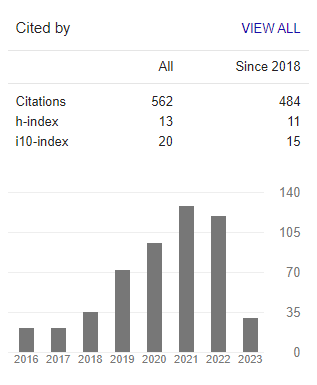CYBER TRAVELING AND CINEMATIC REALITY: Experiences of the K-Drama Fans
Abstract
Involvement in globalization and enjoying various different cultures become easier. With new development in the entertainment industry, K-drama consumers from every corner of the world able to experience Korean daily life and its atmosphere that is delivered into their gadgets. Our research shows that the quality of experience gained by our source from the new entertainment product is relatively similar to the experiences they gained from traveling in general. This phenomenon revealed the new traveling experience which is called cyber traveling, while consumers who enjoy k-drama in our research become our model of cyber traveler. Besides that, the success of the cyber traveling experience is in the presence of cinematic reality. Our research finding shows several facts about what kind of experiences that traveler received through the cinematic reality of k-drama. The finding is also telling about experiences that are similar to daily life, or other experience when a traveler could not distinguish between k-drama visualization and real daily life. Our research use phenomenology as the main method, while in-depth interview, observation, documentation, and online document searching as data collecting methods. This research revealed that the cyber traveling experience could change our sources’ perception about the comparison between real traveling and cyber traveling. In conclusion, we could also see that cyber traveling has become an alternative or in further development even a substitute for real traveling.
To cite this article (7th APA style):
Safira, B. A. & Badaruddin, M. (2021). Cyber traveling and cinematic reality: Experiences of the k-drama fans. Journal Communication Spectrum: Capturing New Perspectives in Communication, 11(2), 108-118. http://dx.doi.org/10.36782/jcs.v11i1.2150
Keywords
References
Ariffin, J. T., Bakar, H. A., & Yusof, N. H. (2018). Culture in Korean Drama towards Influencing Malaysian Audiences. International Journal of Innovative Research in Engineering & Management, 5(1), 10-14. https://doi.org/10.21276/ijirem.2018.5.1.3
Arkiyah, N. (2016). Browsing dan searching sebagai sarana temu kembali sumber-sumber informasi dalam perpustakaan digital. Repository Universitas Ahmad Dahlan. https://eprints.uad.ac.id/id/eprint/3115
Bakry, U. S. (2016). Metode penelitian hubungan internasional. Pustaka Pelajar.
Esterberg, K. G. (2002). Qualitative methods in social research. McGraw-Hill.
Hasanah, H. (2016). Teknik-teknik observasi (sebuah alternatif metode pengumpulan data kualitatif ilmu-ilmu sosial). At-Taqaddum, 8(1), 21-46. https://doi.org/10.21580/at.v8i1.1163
Helaluddin. (2018). Mengenal lebih dekat dengan pendekatan fenomenologi: Sebuah penelitian kualitatif. https://www.researchgate.net/publication/323600431_Mengenal_Lebih_Dekat_dengan_Pendekatan_Fenomenologi_Sebuah_Penelitian_Kualitatif
Herdiansyah, H. (2010). Metodologi penelitian kualitatif: Untuk ilmu-ilmu sosial. Salemba Humanika.
Irwansyah & Lestari, A. F. (2020). Participatory Fandom of Army BTS Indonesia in the Digital Comic on Webtoon Apps. Journal Communication Spectrum, 10(1), 46-57. http://dx.doi.org/10.36782/jcs.v9i1.1872
Jeong, J. S., Lee, S. H., & Lee, S. G. (2017). When Indonesians routinely consume Korean pop culture: Revisiting Jakartan fans of the Korean drama Dae Jang Geum. International Journal of Communication, 11, 2288-2307. https://ijoc.org/index.php/ijoc/article/view/6302
Ju, H. (2020). Korean TV drama viewership on Netflix: Transcultural affection, romance, and identities. Journal of International and Intercultural Communication, 13(1), 32-48. https://doi.org/10.1080/17513057.2019.1606269
Khoiri, A. (2018, March 18). Drama Korea punya potensi pasar besar di Indonesia. CNN Indonesia. https://www.cnnindonesia.com/hiburan/20180317185702-220-283840/drama-korea-punya-potensi-pasar-besar-di-indonesia
KOCIS. (2012). K-drama: A new TV genre with global appeal. Korean Culture and Information Service. https://www.korea.net/Resources/Publications/About-Korea/view?articleId=2226
Kurt, I., & Gök, H. (2015). Impact of Technology on the Perceptions of Culture Shock. Mevlana International Journal of Moral and Values Education, 2(2), 21-28.
Lee, H. (2017). A ‘real’ fantasy: Hybridity, Korean drama, and pop cosmopolitans. Media, Culture & Society, 40(3), 365-380. https://doi.org/10.1177/0163443717718926
Lee, M. J. (2020). Touring the land of romance: Transnational Korean television drama consumption from online desires to offline intimacy. Journal of Tourism and Cultural Change, 18(1), 67-80. https://doi.org/10.1080/14766825.2020.1707467
Leksmono, D. L. D. (2016). The process of audience involvement with the media personae on the film of “descendants of the sun” among young female Indonesian viewers. Journal of Education and Social Sciences, 4, 219-224. https://www.jesoc.com/wp-content/uploads/2016/08/SS-66.pdf
Liu, Y. (2012). Exploring the impacts of cultural globalization on cultural awareness/value and English writing in the Chinese context. Intercultural Communication Studies, 21(2), 94-110.
Maher, M. (2016, March 21). Reality vs. cinematic reality. The Beat. https://www.premiumbeat.com/blog/reality-vs-cinematic-reality
Morris, W. (1973). The American heritage dictionary of the English language. Houghton Mifflin Harcourt.
Teh, P. Y. & Goh, H. C. (2016). Does Korean Drama Have a Real Influence? An Analysis of Malaysia Outbound Tourists to South Korea. Tourism Culture & Communication, 16(3), 147-160. https://doi.org/10.3727/109830416X14750895902882
Tuffour, I. (2017). A critical overview of interpretative phenomenological analysis: A contemporary qualitative research approach. Journal of Healthcare Communications, 02(04). https://doi.org/10.4172/2472-1654.100093
Wijaya, B. S. (2019). Riset Komunikasi Merek. UB Press
Wees, D. (2009, October 18). Definition of cyber-culture. The Reflective Educator. https://davidwees.com/content/definition-cyber-culture/
Refbacks
- There are currently no refbacks.

This work is licensed under a Creative Commons Attribution 3.0 License.
Indexed by:
Archived in:
Listed in:
INTERNATIONAL ASSOCIATION FOR MEDIA AND COMMUNICATION RESEARCH


















